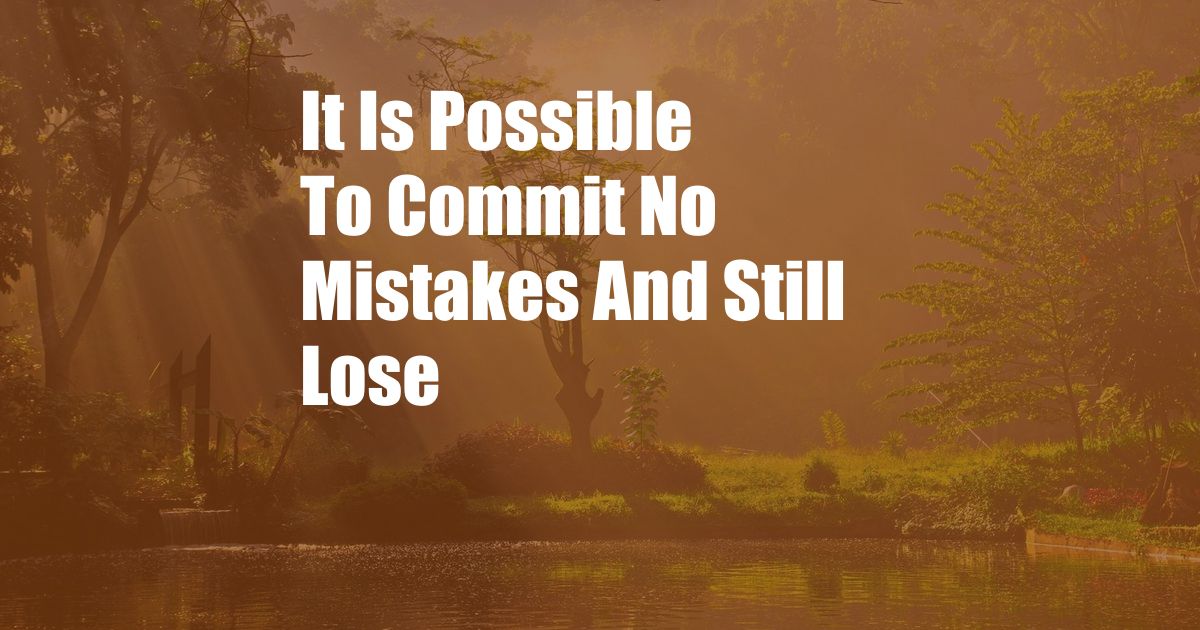
**Is It Possible to Commit No Mistakes and Still Lose?**
We often hear the adage, “If you don’t make mistakes, you can’t learn and grow.” This implies that mistakes are an essential part of the learning process. But what if there are times when you make no mistakes and yet still lose? Is it really possible?
Unfortunately, the answer is yes. There are indeed instances where despite our best efforts and lack of errors, we may still face defeat. Such situations can be incredibly frustrating and disheartening, but understanding the reasons behind them can help us navigate these challenges more effectively.
**Uncontrollable Circumstances**
One of the primary reasons for losing despite making no mistakes lies in the realm of uncontrollable circumstances. These are external factors that we have no power over and can significantly impact our outcomes. For example, in a game of chance like poker, the cards we are dealt are entirely random and can play a decisive role in our success or failure, regardless of our skill level.
Similarly, in a business venture, unexpected market fluctuations, technological advancements, or changes in government regulations can disrupt our plans and lead to setbacks, even if we have made sound decisions and executed them flawlessly.
**Imperfect Information**
Another factor that can contribute to losing without making mistakes is imperfect information. In many situations, we must make decisions based on incomplete or limited information. This can lead to misjudgments and suboptimal choices, even if we are not at fault for not having access to more complete information.
For instance, in a game of strategy like chess, we may have to make moves based on our opponent’s visible actions, but we cannot know their underlying intentions or future plans. This limited information can result in strategic mistakes, even if we have played perfectly up to that point.
**Unforeseen Consequences**
Even with careful planning and execution, there may be unforeseen consequences that can derail our efforts. Sometimes, the interactions between different factors can create unexpected outcomes that we could not have anticipated. This is especially true in complex systems, such as economic markets or biological ecosystems.
For example, in a scientific experiment, the researcher may follow all protocols meticulously, but an unforeseen chemical reaction or a subtle change in the environment could alter the results, leading to an unexpected outcome.
**Tips and Expert Advice**
While it is not always possible to avoid losing despite making no mistakes, there are certain strategies and expert advice that can help us mitigate the impact of uncontrollable circumstances, imperfect information, and unforeseen consequences:
- **Stay informed:** Keep yourself updated with the latest news, trends, and developments in your field or area of interest. This can help you anticipate potential obstacles and make more informed decisions.
- **Plan for contingencies:** Develop backup plans and alternative strategies in case things don’t go as expected. This will allow you to adapt quickly to changing circumstances and minimize losses.
- **Seek feedback and advice:** Consult with experts, mentors, or colleagues who have experience in similar situations. Their insights can provide valuable guidance and help you avoid common pitfalls.
Remember, losing without making mistakes is not a sign of failure but an opportunity for learning and growth. By understanding the factors that contribute to such outcomes and implementing strategies to mitigate their impact, we can improve our resilience and emerge stronger from these challenges.
**FAQ**
Q: Is it true that you can win without making mistakes?
A: While it is possible to win by making fewer mistakes than your opponents, there are no guarantees of victory in situations where there are external factors or randomness involved.
Q: What is the best way to deal with losing despite making no mistakes?
A: The best approach is to analyze the situation, identify the factors that contributed to the loss, and learn from the experience. Focus on developing strategies to mitigate potential risks and improve your performance in the future.
Q: Is it important to admit when we have made a mistake?
A: Yes, admitting our mistakes is crucial for growth and improvement. It allows us to take ownership of our actions, learn from our errors, and avoid repeating them in the future.
**Conclusion**
It is possible to commit no mistakes and still lose due to factors beyond our control, imperfect information, or unforeseen consequences. While it can be frustrating, it is important to recognize that losing is not always a consequence of our actions but can be influenced by external circumstances. By understanding these factors, implementing strategies to mitigate their impact, and learning from our experiences, we can improve our resilience and emerge stronger from these challenges.
Are you interested in learning more about the topic of “Is It Possible to Commit No Mistakes and Still Lose?”